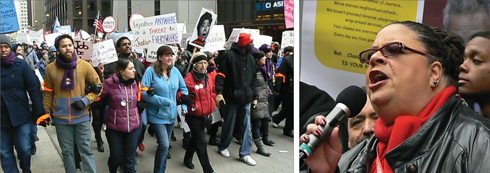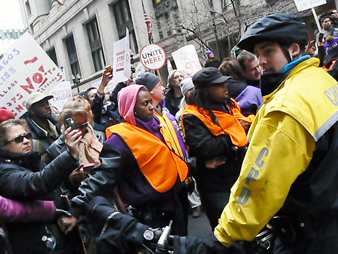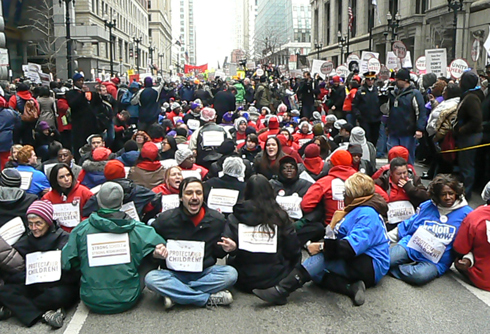Education in Crisis
By La Risa Lynch Contributing Writer | Last updated: Apr 3, 2013 - 10:32:02 AMWhat's your opinion on this article?

(L) Marchers protest Mayor Rahm Emanuel recent decision to close 53 Chicago Public schools, many which are located in both Black and Latino communities. (R) Karen Lewis, head of the Chicago Teachers Union. Photos: La Risa Lynch
|
Closures of 53 schools tied to education profiteering, say critics
CHICAGO (FinalCall.com) - Emotions ran high as hundreds flooded Chicago streets to protest Chicago Public Schools’ decision to shutter 53 elementary schools that opponents of the plan say lacked community input, disregards student safety and doesn’t improve schools.
The head of the Chicago Teachers Union stirred the crowd when she called the Chicago Public School plan racist.
“Let’s not pretend when you close schools primarily on the south and west sides (of Chicago) that the children who would be affected are Black. Let’s not pretend that’s not racist,” said Karen Lewis, a 22 year veteran teacher.
CPS says the school closings are necessary since many of its buildings are underutilized. The district has 500,000 seats, but only 400,000 students. Students from schools slated for closure will be consolidated into existing better performing schools, officials say.

Protesters with signs demonstrating their disapproval of the closing of numerous Chicago schools, effective, June 2013.
|
CPS officials say the move is to realign a district facing a budget crunch and has seen a decline in its student population. The $1 billion saved from the closures over the next 10 years would be redirected as resource back into the schools, they say.
“The city has been losing population and student population for a couple of decades, and we have changed the footprint of the school system to keep pace,” CPS spokesperson Dave Miranda said.
But educational advocates say that what’s happening in Chicago is emblematic of a greater national push to privatize and capitalize public education.
School districts in Washington D.C., Baltimore, Philadelphia, and Detroit have seen their fair share of school closings. Detroit plans to close nine schools and convert four to charter schools, while New York targeted 17 for closures, according to news reports.
Chicago, however, has set a precedent by closing so many schools, says Horace R. Hall, Ph.D., DePaul University’s associate professor of education policy studies and research. Mr. Hall believes Chicago will be a model for other major cities to follow when closing schools.
“You had a number close to that in D.C., but nothing like this anywhere,” Mr. Hall said. “So there needs to be backlash. This backlash is the correct response to a criminal act.”
Mr. Hall noted that 90 percent of schools slated to close are in Black low-income neighborhoods. The majority of those kids go from one failing school to another.
Additionally, students in low performing schools are less likely to meet charter school admission requirements while many charter schools don’t offer English-learner or special ed classes, he said. Closing schools take away a child’s right to a public education, Mr. Hall added.
“We are leaving a lot of families and their children high and dry,” he said.
Similar education reforms have put 60 Philadelphia pubic schools in the crossfire. The Philadelphia school system plans to close 60 schools over the next two years. The district closed eight last year and plan a whopping 23 schools this year—all serving predominately poor neighborhoods of color in the city of Brotherly Love.
However that number is down from 37 after community groups, parents, students and unions organized against the move. This round of closing only impacts nearly 13,000 students compared to 17,000 under the original proposal.
School performances, budget woes and utilization were key reasons Philadelphia shuttered schools. But Ron Whitehorne, of Philadelphia Coalition Advocating for Public Schools (PCAPS), cites a movement to turn education into a commodity as the real reason for Philadelphia to close schools.
“There is a conscious well developed strategy to privatize school districts,” Mr. Whitehorne said. “There is a very strong charter school lobby here.”
He noted that several organizations, including the Gates Foundation “has put a lot of money into charter schools.” Many charter school boards, he explained, are comprised of CEOs and hedge fund managers.
“They are not doing it because they love poor school children. They are doing it because there is money to be made,” Mr. Whitehorne said.

Protestors block a downtown city street to protest the closing of 53 Chicago Public schools.
|
PCAPS won some victories though. They got a one year moratorium on school closings. The Justice Department has agreed to investigate their civil rights complaint since the closures disproportionately effect Latino and Black students.
Jitu Brown, of the Kenwood Oakland Community Organization, a grassroots Chicago-based community group, questioned CPS reasoning for regurgitating failed school policies.
Under Renaissance 2010, CPS wanted to open 100 new schools by closing 60 schools labeled underutilized or underperforming. Many of those schools were replaced with charter schools. Of those, Mr. Brown said, only 18 percent are high performing. Since 2002, CPS closed 105 schools and did actions on 17 schools last year.
Mr. Brown cited a Stanford University study that showed in charter schools in 16 states including Illinois, only 1 in 5 outperform neighborhood schools while 4 out of 5 either were the same or worse.
“There is not a record of school closings being an effective model for school improvement,” he said.
Phil Jackson, of the Blackstar Project, a Chicago-based educational advocacy group, also decried CPS plan. But he said national policies are driving this school closure push. Those policies heavily focus on testing and a proliferation of charter schools. Mr. Jackson said schools should be held accountable, but it shouldn’t be done in a chaotic way.
“I’m not saying that we shouldn’t close some schools, because some schools need to be closed,” said Mr. Jackson, CPS former chief of staff from 1995-1999. “It needs to be done in away that we can guarantee success of the children from the schools being closed and the schools they will be attending.”
Teachers at the March 28 rally criticized CPS’s decision to close schools. Many say it was done with little input and without regards to safety.
“If we had an administration that is steady and consistent making decisions, they probably could come up with something that works,” said Valerie Collins, a 17 year veteran teacher. “But considering the fact the CEO has changed how many times in how many years, they are in no position to be making huge decision like this.”
CPS’s current head, Barbara Byrd-Bennett, is the third chief at the district’s helm since Arne Duncan left to be President Obama’s education czar in 2009.
Safety is a concern for middle school teacher Tara Stamps. Her school, Jenner Elementary School of the Arts, is merging with another school that resides in a different gang boundary. She said this is the third consolidation her school has undergone in nine years.
“By continuing with these racist school closings, you are literally throwing children in harm’s way,” Ms. Stamps said.
She too wants a moratorium on school closings to develop a better plan of action. But when asked whether CTU’s fury over school closings was more about saving their jobs than ensuring a quality education, Ms. Stamps emphatically said no.
Teachers, she said, should not be vilified for wanting to save their jobs, especially in a field that is predominately Black and female. However, the real issue here, she contends is the apartheid system that keeps education “still separate and still unequal.”
“If charter schools are the best that they have to offer then why the hell are they only in Black and Latino communities,” Ms. Stamps said.
(This is Part 1 of a two part series on education and school shutdowns. Part 2 will examine school failure, Black children and the state of public education.)
INSIDE STORIES AND REVIEWS
-
-
About Harriett ... and the Negro Hollywood Road Show
By Rabiah Muhammad, Guest Columnist » Full Story -
Skepticism greets Jay-Z, NFL talk of inspiring change
By Bryan 18X Crawford and Richard B. Muhammad The Final Call Newspaper @TheFinalCall » Full Story -
The painful problem of Black girls and suicide
By Charlene Muhammad -National Correspondent- » Full Story -
Exploitation of Innocence - Report: Perceptions, policies hurting Black girls
By Charlene Muhammad -National Correspondent- » Full Story -
Big Ballin: Big ideas fuel a father’s Big Baller Brand and brash business sense
By Bryan Crawford -Contributing Writer- » Full Story






 Click Here Stay Connected!
Click Here Stay Connected!








